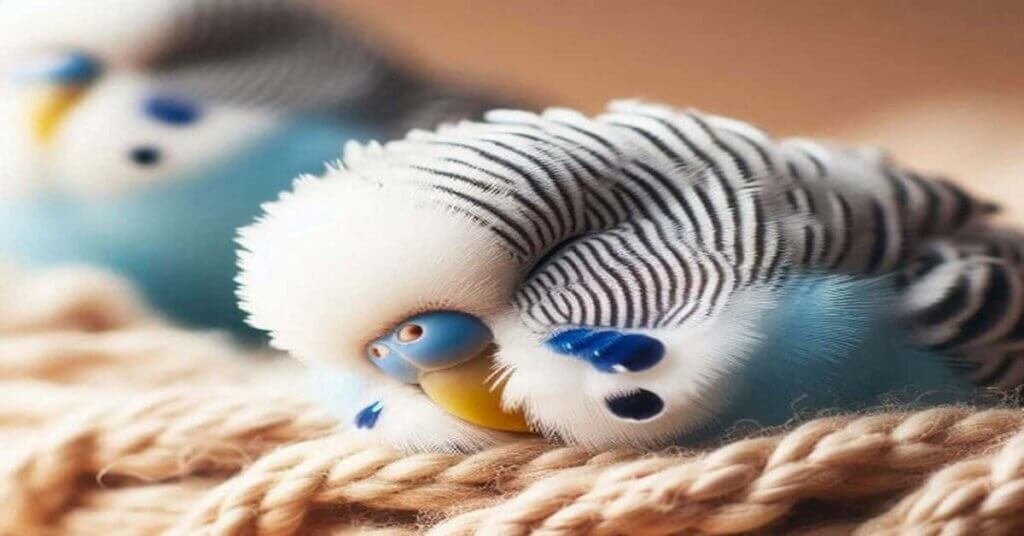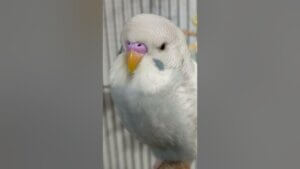Is It Normal For My Budgie To Sleep During The Day?
Yes, it is normal for budgies to nap during the day. Budgies often take short naps (20-45 minutes) to rest.
Budgies are naturally active birds but also need rest to maintain their health. These tiny birds often take several short naps throughout the day, which is normal. Regular daytime naps help them stay energetic and alert. To support their sleep patterns, ensure their environment is calm and free from excessive noise.
Providing a consistent light-dark cycle mimics their natural habitat, promoting better rest. If your budgie seems excessively sleepy or lethargic, consult a vet to rule out any health issues. Understanding their sleep habits ensures your budgie stays happy and healthy.
Budgie Sleep Patterns

Understanding your budgie’s sleep patterns is essential. Budgies, like many birds, have unique sleeping habits. They need proper rest to stay healthy and happy. Let’s dive into their typical sleep habits and daytime napping.
1. Typical Sleep Habits
Budgies usually sleep at night. They need about 10-12 hours of sleep. They prefer a dark, quiet space for sleeping. Covering their cage at night can help them sleep better. Budgies also have a light sleep, so sudden noises can wake them up.
During sleep, budgies might tuck their head under a wing. They may also stand on one leg. These behaviors are perfectly normal. They help the budgie feel safe and comfortable.
2. Daytime Napping
It is usual for budgies to nap during the day. These naps are usually short, lasting about 10-15 minutes. Daytime napping helps them rest and recharge. You might see your budgie napping on a perch or in a corner of the cage.
Frequent naps can indicate your budgie is not getting enough sleep at night. Ensure their environment is suitable for nighttime rest. If your budgie sleeps excessively during the day, it might be a sign of illness. Consult a vet if you notice unusual sleep patterns.
| Sleep Aspect | Details |
|---|---|
| Night Sleep | 10-12 hours in dark, quiet space |
| Daytime Naps | Short naps lasting 10-15 minutes |
| Sleep Posture | Head under wing, standing on one leg |
Factors Affecting Sleep
Understanding the factors affecting your budgie’s sleep can help ensure their well-being. Budgies might sleep during the day for various reasons. Let’s explore some key factors that influence their sleep patterns.
1. Age And Sleep
Budgies’ sleep needs change with age. Young budgies need more sleep to grow and develop. They may take frequent naps during the day.
Older budgies also need more rest. They might sleep during the day to conserve energy. Ensure they have a quiet, comfortable place to rest.
2. Health And Sleep
Your budgie’s health greatly affects their sleep. A sick budgie may sleep more to recover. If your budgie sleeps a lot and appears unwell, visit a vet.
Budgies need a balanced diet to stay healthy. Nutrient deficiencies can lead to increased sleep. Ensure they have a variety of seeds, fruits, and vegetables.
Stress also impacts sleep. Loud noises or changes in their environment can make them anxious. A calm and stable environment helps them sleep better.
| Factor | Effect on Sleep |
|---|---|
| Age | Younger and older budgies need more sleep. |
| Health | Sick budgies sleep more to recover. |
| Diet | Balanced diet ensures proper sleep. |
| Stress | Stressful environments disrupt sleep. |
A balanced diet, a stress-free environment, and regular health check-ups ensure your budgie sleeps well. Understanding these factors can help your budgie live a happy and healthy life.
Signs Of Budgie’s Healthy Sleep

Understanding your budgie’s sleep patterns is crucial. This helps ensure their health and happiness. Budgies, like humans, need adequate rest. Healthy sleep is essential for their well-being. Let’s explore the signs that indicate healthy sleep in budgies.
1. Normal Sleep Behavior
Budgies usually sleep at night. But they can nap during the day, too. These naps are short and frequent. Normal sleep behavior includes:
- Resting on one leg
- Fluffed-up feathers
- Head tucked under a wing
- Quiet and relaxed posture
These signs show your budgie is comfortable and relaxed. A calm environment helps them sleep better. Ensure they have a quiet space for resting.
2. Warning Signs
Not all sleep is healthy. Be alert for warning signs. These indicate potential health issues. Warning signs of unhealthy sleep include:
- Sleeping too much during the day
- Constantly fluffed-up feathers
- Unusual breathing patterns
- Lethargy and lack of interest in activities
If you notice these signs, consult a vet. Early detection can prevent serious health problems. Keep an eye on your budgie’s behavior and sleep patterns.
Creating A Sleep-friendly Environment
Ensuring your budgie has a sleep-friendly environment is crucial for its health. Budgies need a safe, quiet place to rest. This helps them feel secure and less stressed.
1. Cage Setup
A well-arranged cage can make your budgie feel at home. Place the cage in a quiet room, away from loud noises. Please keep it clean and free from drafts. Ensure the cage is big enough for your budgie to stretch its wings. Add comfortable perches at different heights. This helps the budgie choose its favorite sleeping spot.
Covering the cage at night can help your budgie sleep better. Use a breathable cloth to cover the cage. This simulates night-time and reduces light and noise.
2. Lighting Conditions
Proper lighting is essential for your budgie’s sleep. Budgies need around 10-12 hours of sleep each night. Natural light can help regulate their sleep cycle. Place the cage near a window to provide natural sunlight. Ensure the cage is not in direct sunlight, which can be too harsh.
Artificial lighting should mimic natural light. Use a timer to provide consistent light and dark periods. Turn off bright lights at night to create a calm, sleep-friendly environment.
Common Sleep Disturbances
Budgies, like all pets, need their sleep. But sometimes, they face common sleep disturbances that can affect their rest. Understanding these disturbances can help ensure your budgie sleeps well.
1. Noises And Disruptions
Budgies are sensitive to loud noises. Sudden sounds can wake them up. This includes noises from the TV, loud music, or even a barking dog.
Placing your budgie’s cage in a quiet room can help. Avoid areas with heavy foot traffic. This reduces the chance of your budgie being disturbed by daily activities.
| Disruption | Impact |
|---|---|
| TV and Music | Interrupts sleep cycle |
| Barking Dogs | Startles the budgie |
| Foot Traffic | Creates constant disturbance |
2. Stress Factors
Stress can affect your budgie’s sleep. Changes in their environment can be a major stressor. New pets, moving homes, or even a new cage can cause stress.
To reduce stress, maintain a consistent routine, introduce changes slowly, provide a calm and comfortable environment, and ensure the cage is comfortable and safe.
- Keep a consistent daily routine.
- Introduce new pets gradually.
- Ensure the cage is comfortable and safe.
Reducing noise and stress can help your budgie sleep better during the day.
Credit: www.talkbudgies.com
When Need To Consult A Vet For Budgie Abnormal Sleep Behavior
Budgies are small, colorful birds that bring joy to many homes. While it’s normal for budgies to nap during the day, too much sleep can signal a problem. Knowing when to consult a vet can help keep your budgie healthy.
Recognizing Problems
Pay attention to changes in your budgie’s behavior. If your budgie is sleeping more than usual, it might be sick. Look for other symptoms like:
- Loss of appetite
- Fluffed-up feathers
- Difficulty breathing
- Lethargy
If you notice these signs, act quickly. Early intervention can save your budgie’s life.
Professional Advice
A vet can provide expert advice and treatment. They will check your budgie for common illnesses, such as infections, parasites, and nutritional deficiencies. They may also run tests to find the cause of the problem.
Always choose a vet who specializes in birds. This ensures your budgie gets the best care.
Regular vet visits can prevent many issues. Schedule check-ups at least once a year.
| Symptom | Possible Issue |
|---|---|
| Excessive Sleep | Illness, Stress |
| Loss of Appetite | Infection, Digestive Problems |
| Fluffed-up Feathers | Cold, Illness |
Keep a close eye on your budgie’s health. Quick action can make a big difference.
Tips For Budgies’ Better Sleep Pattern

Your budgie’s sleep patterns are crucial for its health. Ensuring your pet gets quality sleep is essential. Here are some tips for getting better sleep for your budgie.
1. Daily Routine
A consistent daily routine is vital for your budgie’s sleep. Try to maintain a regular schedule for feeding, playtime, and sleep. Budgies thrive on predictability. A set routine helps them feel secure and relaxed.
Make sure to cover the cage at night. This simulates nighttime and encourages your budgie to sleep. Budgies need around 10-12 hours of sleep each night. The cover should be breathable and block out light.
2. Diet And Sleep
Proper nutrition affects your budgie’s sleep quality. Ensure your budgie eats a balanced diet. Fresh fruits, vegetables, and high-quality birdseed are essential.
Some foods can boost sleep quality. Consider these options:
- Leafy greens: Spinach and kale provide essential nutrients.
- Fruits: Apples and berries offer vitamins and hydration.
- Grains: Quinoa and oats can be good sources of energy.
Avoid feeding your budgie sugary or fatty foods. These can disturb their sleep patterns. Fresh water is also crucial. Always provide clean, fresh water daily.
Maintaining a healthy diet and consistent routine can improve your budgie’s sleep. These simple steps can make a big difference in their overall well-being.

Credit: m.youtube.com
Myths About Budgie Sleep
Budgies are fascinating pets. Many owners worry if their bird sleeps during the day. There are many myths about budgie sleep. Let’s clear up these myths.
Debunking Common Beliefs
One common myth is that budgies only sleep at night. This is not true. Budgies can nap during the day. Like humans, they need rest. Another myth is that daytime sleep means illness. Budgies may nap to recharge. It doesn’t always mean they are sick.
Some people believe budgies need complete darkness to sleep. Budgies can sleep with some light. They feel safe and secure. This helps them rest better.
Facts You Should Know
Budgies usually sleep 10-12 hours at night. They may nap during the day. Daytime naps are short, lasting 15-30 minutes. They help budgies stay active and healthy. Ensure your budgie has a quiet place to sleep. This helps them feel secure.
Budgies may sleep more during molting. Molting can be tiring. Extra sleep helps them recover. Provide a balanced diet. This supports their health during molting.
| Myth | Fact |
|---|---|
| Budgies only sleep at night. | Budgies nap during the day too. |
| Daytime sleep means illness. | Daytime naps are normal for budgies. |
| Budgies need complete darkness to sleep. | Budgies can sleep with some light. |
Understand these facts about budgie sleep. This helps you care for your pet better. Your budgie will be happy and healthy.
Frequently Asked Questions
How Much Sleep Do Budgies Need?
Budgies need around 10-12 hours of sleep each day. This includes nighttime sleep and daytime naps.
Should I Be Concerned About Daytime Sleeping?
Occasional daytime sleeping is normal. However, excessive sleeping may indicate health problems. Consult a vet if concerned.
How Can I Tell If My Budgie Is Sick?
Look for signs like lethargy, changes in appetite, or unusual droppings. Consult a vet for a proper diagnosis.
Wrap Up
Understanding your budgie’s sleep patterns can ease your worries. Daytime naps are usually normal for budgies. Keep an eye on their overall health. Ensure they have a comfortable environment. If concerned, consult an avian vet. Happy, healthy budgies bring joy to any home.
Enjoy your time with your feathered friend!
Hello Dear, I'm Poli Kolymnia, owner of many birds (including budgies).
With a deep passion for these feathered companions, I'm here to share my expertise and extensive knowledge on birds care.
My articles cover essential topics like diet, housing, care, and health, providing practical tips to help you create a happy and thriving environment for your birds.







